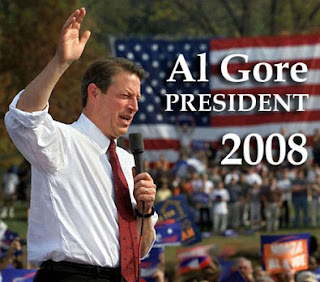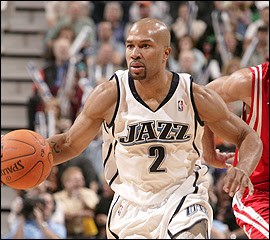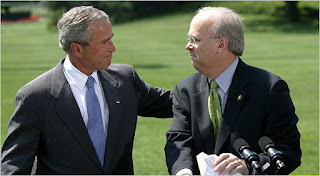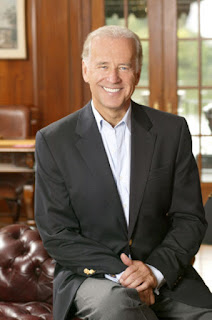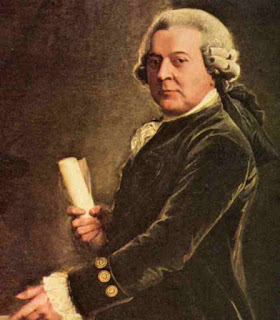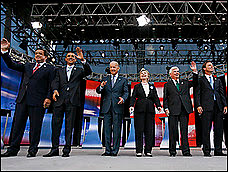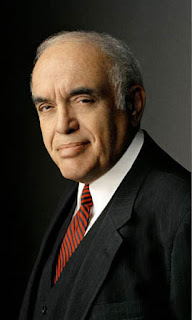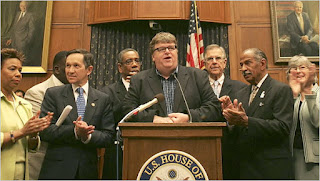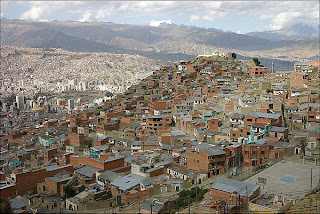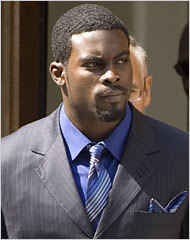
Michael Vick, former quarterback for the Atlanta Falcons and Virginia Tech, is an exceptional athlete even among professional athletes. He comes with star power. It's not that he is, or ever could be, the best quarterback who ever played. I have been disgusted by the ridiculous praise that he's been given at times. The hope in some people's minds was that he'd learn to be a real passer, and with that, become the best quarterback that ever played the game. But there's every indication that he didn't have the mental acuity to read defenses to the degree he'd need to in order to be an elite quarterback. Nonetheless, Michael Vick has something that no one's ever seen in a quarterback before--at least, not to the extent that he has it. Vick has the athleticism at quarterback to always be a threat to turn a scramble into a touchdown on any given play. And for that reason he became the first quarterback to ever rush for over 1000 yards in the NFL.
We don't know if Michael Vick would be a good running back. He might not be. But when defenses are spread out worrying about Vick's rocket of an arm launching a pass down the field, Vick is as good as we've ever seen at taking advantage of that and romping down the field to turn a busted pass play into highlight-reel run.
There's a problem that comes with that, however, and that is that defenses begin gunning for you. There's a good chance that Vick could not get through many seasons without injury because he runs the ball so much. In 2001, he was on the injury report twice with a bad back. In 2002, he was on the injury report 6 times because of injuries to his hand and shoulder. In 2003, he was on the injury report 13 times, and missed 9 games, because of an injured leg. In 2005, he was on the injury report 4 times with leg and shoulder problems. 2004 and 2006 were his lucky years. In 2004, he was only on the injury report once. And he was never injured last year, and that's why he ran for so many yards. But how many years is he going to go uninjured when he runs the ball so much? Based on his history and the history of quarterbacks in general, he wasn't going to be so lucky too many years.
Even with his health last year, the Falcons weren't winning. It cost their coach his job. Vick was not living up to all the hype surrounding him, despite the highlight-quality runs he was pulling off. And so he, or his team, was getting booed. And Vick's response was to give his own fans not just one, but two middle fingers. Needless to say, this action didn't endear him with the fans, or Falcons management.
Before I go on, I should mention that in 2004, Michael Vick became the highest paid quarterback in NFL history, signing a 10-year, 130 million dollar contract with 37 million dollars in guaranteed bonus money besides that. This doesn't include the endorsement money that came to him left and right from companies like Nike, hoping to find the Michael Jordan of football. Would everyone want to be like Mike? Nike and others banked on it.
We didn't hear what kind of person Michael Vick was. We didn't see much of Vick because he seemed a little shy, actually. He's not very good in front of a camera. But we did start hearing about his wayward brother Marcus, who was a quarterback following in his brother's footsteps at Virginia Tech until he was expelled from the college due to a series of infractions that they could no longer put up with. In one case, he was convicted of providing alcohol to minor girls. In other case, he was sued by a girl who said that she had sex with Vick while she was a minor for two years, and that Vick had encouraged her to have sex with other men during that period. She also said that he had supplied her with alcohol and marijuana. At another point, Vick was arrested for reckless driving and possession of marijuana.
Virginia Tech suspended Marcus Vick, but gave him another chance. They were glad that he did, as he led their team to a bowl game and a chance for the national championship.
The problem was that character issues always seemed to short-circuit Vick's talent. Vick gave fans at the University of West Virginia the middle finger. It seems to run in the family. Maybe that's not all that runs in the family? Then Vick, during what should have been the highlight of his college career--playing in the bowl game--stomped on the arm of the opposing teams downed lineman. He didn't accidentally step on the arm of someone who was down. He stopped, took aim, and stomped on the arm. Then, while Virginia Tech was considering what to do about that, Vick aimed a gun at three teenagers in a McDonald's parking lot for allegedly saying something disparaging to his girlfriend.
As for the expulsion from college, Marcus Vick showed no remorse. In his arrogance, Vick simply told the press, "It's not a big deal. I'll just move on to the next level, baby." By the next level, he meant the NFL. Vick told interviewers that he was the best quarterback in the college draft, and better even than his brother Michael. NFL executives evidently didn't think so. He went undrafted, but was signed as a free agent to try out with the Dolphins. He did not make the team, but was signed to its practice squad. Later in the year, he was called up to the team due to injuries and got to play briefly in one game, but while playing receiver, caught no passes. In May of this year, he was released from the team and hasn't been picked up by anyone else.
Initially, people wondered how Michael Vick's wayward brother Marcus could be so different than their hero was. Now, we have to wonder if he really is so different, because we've begun to see Michael Vick's true colors. In 2005, Vick was sued by a woman who alleged that Vick had knowingly given her herpes without letting her know she was at risk. It became known that Vick had sought treatment for the disease under the alias "Ron Mexico," and therefore had indeed known of his condition. He settled the suit out of court for an undisclosed amount of money. Then came the obscene gestures incident in front of his fans. Next, in January of this year, Vick tried to bring a water bottle with a hidden compartment onto a flight he was taking out of Miami. Vick didn't want to give the water bottle up, and threw it away. Miami police retrieved it and found the hidden compartment and a small particle of something that had the look and smell of marijuana, but they were unable to prove it and charges were dropped. It raised big questions, but then came the serious allegations. It seems that Michael Vick has sponsored an illegal dog-fighting racket from his farm in Virginia, and was gambling on the dog-fighting. And as if that weren't enough, he is now alleged to have personally executed dogs that he deemed inadequate as fighters. He lied to the Atlanta Falcons owner and the NFL commissioner about his involvement. And we now know this because he has pled guilty to the charges, which will lead to serious jail time. Vick was forced to plead guilty because there are too many witnesses against him, and if he doesn't take a plea bargain, he'll face federal racketeering charges.
Of everything I've seen written on this subject, the best article yet to appear is, I think, Sally Jenkins' article that appears today in the Washington Post. It's called "The Gall of it All." There are still quite a number of defenders of Vick and his dog-fighting. The defenses range from puzzled questioning as to what's the big deal about dog-fighting to pleas that Michael Vick is only human, and he's just made a mistake... an error in judgment. Along the way, of course, there are charges of racism, and people wondering what would have happened if it had been Peyton Manning instead of Michael Vick. The implication is that Manning, who is unquestionably one of the two best quarterback in football (along with with Tom Brady), would have gotten off because he's white. But this begs the question: Manning isn't involved. Everything we know about Manning is that his values are everything one could hope for in the person who is the face of his team and his city. The problem with Michael Vick isn't that he's black. It's that he is engaged in a criminal behavior that is heinous. Manning isn't involved in any criminal activities that we know of. So, the comparison is a red herring. It's ludicrous.
Jenkins writes: "If an animal didn't perform well enough, if it wasn't champion enough, if it was in Vick's judgment flawed, he strangled it, drowned it, electrocuted it or beat it to death on the ground. Vick and his pals deliberately enslaved and tormented weaker creatures, and killed those they considered inferior. The dogs had faces and voices that would have eloquently expressed their agony, and Vick hurt them anyway, repeatedly. The crimes may have been committed against canines, but at issue is basic humanity. Commit those crimes against people, and the words we'd use for it are fascism, and genocide. Don't kid yourself: The people who are so angry at Vick are angry for all the right reasons."
Jenkins quotes Vick's attorney, who says like so many of his other defenders, "Michael is a father, he's a son, he's a human being -- people oftentimes forget that." But Jenkins won't have any of that. She says, "Pardon, but if anybody forgot his humanity, it was Vick. Not us."
And that brings me to the real question, for me, as a philosopher and theologian. How does the human heart become so depraved that it cannot see that cruelty to other beings is wrong? How is it that we can have so many people in our own society who do not understand the seriousness of the crime that Vick was involved in?
There's another article about Vick written by Aaron Brown, who doesn't see why people can laugh at good ol' boy humor about shooting animals in other contexts, and yet get enraged over Vick's involvement in dog-fighting. Brown's article is representative of the reaction of a lot of people who don't really value animal life. Animals are just things to them. And they think that concern for other creatures, especially non-human creatures, are just dainty products of a sissified liberal culture. Brown rightly points out that for most of human history, dog-fighting and cock-fighting has been perfectly legal. So, he concludes, why the fuss about Michael Vick?
To begin with, the New York Times has an article by Michael Schmidt that suggests that Vick is in more trouble over his gambling involvement than for the dog-fighting or cruelty to animals. That's what has created the possibility of federal racketeering charges. But a good portion of the country, as Sally Jenkins says, is concerned more about the animal cruelty, and that's where my focus is as well.
I can't do more here than raise the question in this context. But to me, it gets at the heart of ethics, and touches on the heart of the question of spiritual awareness. Some people are not spiritually aware or sensitive. They believe that the world is no more than a mechanical device running according to some accident of nature. It may have interesting side-effects that create some pleasurable situations for us, but it most certainly creates pain as well. The goal, for them, becomes utilitarian: to create the most pleasure and avoid the most pain. The question is whether and how far we extend our ethical concern to other creatures. The egoist will only extend their ethical concern so far as it pleases him or her to do. Others might say that we have a tendency, produced by evolution, to realize that our own welfare is tied up with others. But again, when it comes to making choices, the question as to how far to extend our empathy for other creatures seems to be a practical one for the person making the decisions in the particular case. The spiritually aware person, in contrast to this materialist outlook, has sympathy for other creatures because they feel the life of the other creature in their being. The spiritually-aware person may also have practical questions they may have to face when it comes to confronting life and death situations with other creatures. In some cases, the spiritually-aware person may still feel that the death of the creature is warranted for some reason. But in all cases, the spiritually-aware person would only take the life of another with a deep sense of prayerfulness and compassion in connection to the web of life that we are all a part of. In the martial arts of the East, there are traditions of honoring one's opponent as another aspect of oneself. In such cases, there is no divide between the ego and the other that less than self.
